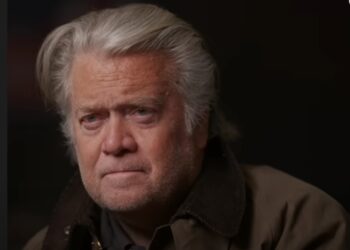The program began with breaking news about Ryan Routh, who was found guilty on all five counts related to an attempted assassination of a major presidential candidate. The charges included possession of a firearm in furtherance of a crime, assaulting a federal officer, and possession of a firearm with an obliterated serial number. After roughly two and a half hours of jury deliberation, the verdict was delivered in a courtroom overseen by Judge Eileen Cannon. The jury had briefly requested to examine the rifle and ammunition involved, and shortly after, returned the guilty verdict. Bannon noted the emotional intensity in the courtroom, describing an incident where Routh attempted to harm himself with a pen, prompting bailiffs to intervene as his daughter screamed. Bannon expressed skepticism about the case, questioning whether Routh acted alone and calling for a thorough investigation to avoid a "grassy knoll” scenario, emphasizing the need for transparency.
The discussion then shifted to media dynamics, specifically targeting late-night television host Jimmy Kimmel. Bannon highlighted a reported revolt by 73 ABC affiliates, primarily owned by Nexstar and Sinclair, against airing Kimmel’s show due to its perceived liberal bias and declining relevance. He framed this as a broader pushback against Hollywood’s progressive influence, describing Kimmel as "poisonous” and urging supporters to dismantle such institutions "brick by brick.” Bannon also criticized Stephen Colbert, claiming his show operates as a mouthpiece for the Democratic Party, loses $40 million annually, and called for its cancellation. He praised the affiliates’ decision as a capitalist stand against unprofitable, ideologically driven programming, encouraging viewers to support Nexstar and Sinclair.
Bannon also addressed election integrity, focusing on a story from The Gateway Pundit about alleged 2020 election fraud in Detroit. He discussed efforts by Huda Miller and Patty McMurray to obtain absentee ballot records from Wayne County, revealing discrepancies after a legal battle. Bannon emphasized the significance of this evidence in validating claims of a "stolen” 2020 election, urging a meticulous process to ensure credibility and avoid dismissal as a conspiracy theory. He suggested that President Trump’s team was aware of these findings, which could have significant implications for election integrity.
Finally, Bannon touched on global instability, referencing Trump’s comments on the Russia-Ukraine conflict and the Middle East. He portrayed Trump as a master negotiator attempting to avert a "third world war” amid turbulent geopolitics, including a failed escalator incident at the UN, which he used as a metaphor for institutional incompetence. Bannon criticized globalist institutions like the UN, advocating for their defunding, and highlighted the growing interest in gold as a hedge against economic uncertainty, citing the central banks’ record purchases.
Bannon: No Mercy. Particularly On Kimmel, No Mercy. Take It All Down, Take It All Apart.
Bannon: Why Don’t We Pull All The Money, Not Just From NY. I’m Talking From Geneva. PULL IT ALL
NJ Man Secures Nearly 1 Million Documents From Detroit’s 2020 Election, Including Copies of Absentee Ballots and Signed Envelopes in One of Largest Election FOIA Hauls In U.S. History
In this hour-long WarRoom episode on September 23, 2025, Steve Bannon interviews Peter Navarro about his new book, I Went to Prison So You Won’t Have To, framing it as a stark warning against government weaponization. Bannon highlights Navarro’s role as a key architect of Trump’s trade policies and praises his resilience amid persecution.
Navarro recounts his humiliating arrest at Reagan National Airport: five armed FBI agents ambushed him and his fiancée Bonnie in a gangway, despite it being a misdemeanor contempt charge. He details being shackled in leg irons, placed in John Hinckley’s cell, and how the media was tipped off. Navarro blasts the rigged D.C. federal courts, naming judges like Amit Mehta, Patricia Millett, and Cornelia Pillard for biased rulings that barred his executive privilege defense. He accuses the system of selective prosecution, noting uncharged Democrats like Dan Scavino and Mark Meadows.
Shifting to prison, Navarro describes entering Miami’s federal facility at 74, stripped searched (including cavity checks), and thrust into a dangerous environment with 200 felons, freezing conditions, poor food, and rampant drugs. He uncovered a billion-dollar scandal in Trump’s First Step Act implementation, where the Bureau of Prisons flouted laws, inflating recidivism. Navarro portrays prison as dehumanizing—constant counts, flashlight checks, and institutional control—yet he stayed productive, writing diaries and aiding inmates.
Both decry “lawfare” against Trump allies, including attempts on Trump’s life and Charlie Kirk’s murder (a reference to threats). They call for accountability, vowing to prosecute perpetrators legally upon Trump’s return. Navarro urges buying the book as a manifesto for justice, emphasizing: if they came for him, they’re coming for everyday Americans. Bannon echoes this, tying it to broader fights against globalism and media bias.

![Bannon’s WarRoom, Show Clip Roundup 11/4/2024 [AM]](https://warroom.org/wp-content/uploads/2024/11/bannonsteve_022424gn06_w-350x250.webp)



